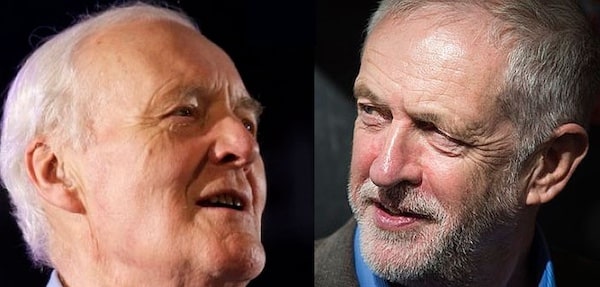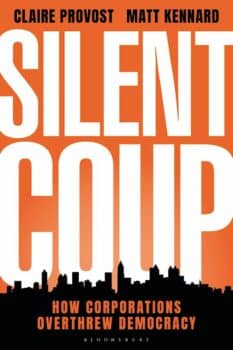This book is about corporate power. The authors report back on their fearless investigations into the realities of the unstoppable rise of global corporations, which occupy the power vacuum left by the collapse of European empires and sabotage the growth of democracy. Vividly revealing the workings of these corporations, they do so in a way that demonstrates the corporations’ vulnerability when their activities are exposed.
Far too often, political activists see their whole being in terms of the framework of the nation state in which they live and work. This book helps us go beyond these limited horizons and develop a strong sense of global thinking and internationalism. After all, whatever country we happen to be living in, global corporations are not particularly bothered about national frontiers. What transnational corporations are interested in is their power, markets and supply chains.
The first time I heard Tony Benn speak was in 1970, at a fringe meeting at the Labour conference. He was reflecting on his years in the British government. Labour had just lost the 1970 election after five-and-a-half years in office under Harold Wilson. Benn had been technology minister.
He described how he tried to have meetings with the largest businesses of the time, how they arrived at his office like visiting emperors, to tell him what to do rather than engage with an elected minister who was trying to democratically administer policies—policies such as widening public ownership and increasing workers participation; policies contained in a manifesto that had an electoral mandate.
Tony Benn’s exposure of corporate power stimulated thought on the left of the Labour Party about how to challenge it on a global level. We realised that traditional policies of public ownership were necessary but not sufficient. Since then, corporate power over our governments has grown significantly.
Take, for example, recent news about how the water companies pollute British rivers and seas by letting raw sewage flow into them. Our rivers were polluted on 300,000 occasions in 2022 alone. The government promised to reduce the number of discharges by 25% over the next three years. This means that even if the companies meet this target, there will still be 225,000 discharges a year—and this doesn’t say anything about the volume of those discharges.
Co-opting the state
So what is the solution? To let these thieves get away with continuing to destroy our rivers, our streams, our seas? Or to do the obvious thing, tell them to bog off and take our water utilities into public ownership. As a natural resource and source of life, this is where they belong.
Silent Coup explains how corporate power affects people all around the world. It shows how agricultural systems, far from being developed in a sustainable way, become unsustainable. Monoculture takes over from diversity in agriculture. The idea of a mixed farm is seen as out-of-date, old fashioned and inefficient.
In a mixed farm, one crop feeds another. The result is a symmetry that protects the environment. I remember my dad explaining to me as a child as we were looking at such farmland near where we lived in Shropshire.
He explained how this land had been fertile for over a thousand years because it had been managed in a sustainable way. He then explained how the ranching mentality had now taken over whereby the hedgerows are destroyed, the trees are cut down, the diversity of production on the farm is reduced to monoculture.
Moreover, instead of being fertilised by manure, the new industrial agriculture is using herbicides and pesticides and chemical fertilisers, which have a long-term effect on the food chain for all of us. Why is this happening? Because chemical fertilisers are being pushed by big businesses that make a great deal of money out of them.
Partly in response to the growing criticism of all this pollution of our water and of our food, along with the threats of climate change, we face the phenomenon of the greenwash.
BP would have us believe that it only exists to protect the planet. It tells us this every single day and spends a great deal of money doing so. It never says anything about the grotesque levels of oil spills and damage to the environment.
ExxonMobil doesn’t tell us about the horror story of what has happened in Ecuador. Shell doesn’t tell us what has happened in the Delta regions of Nigeria.
Silent takeover
This book demonstrates, with many examples, how a silent yet steady takeover of government and the economy by corporate power means we are faced with a combination of corporate greed, consumerism and a media that is not prepared to investigate the reality of what is happening in front of them.
I was in Colombia for the presidential election in 2022, where we met a group of land rights campaigners. They described their work and the bravery with which they stood up against corporate interests, including those that have assassinated many of the campaigners.
I asked them what would happen if the left candidate Gustavo Petro didn’t win the election. One of their leaders said,
We’ll continue campaigning for land rights. We’ll continue campaigning for education in rural communities. And we’ll continue campaigning for sustainability.
And what if Petro won the election (which he did)?
We’ll continue campaigning for land rights, we’ll continue campaigning for workers’ rights, we’ll continue campaigning for sustainable energy. Because political power comes from the power of communities to influence and pressure those in government. You can’t just hand it all to somebody high and mighty above you, to do it for you. It is about empowering people.
Silent Coup does many things. Above all, it educates people. To educate people is to inform people. And to inform people is to empower and activate them. Claire Provost and Matt Kennard have empowered and activated their readers.


